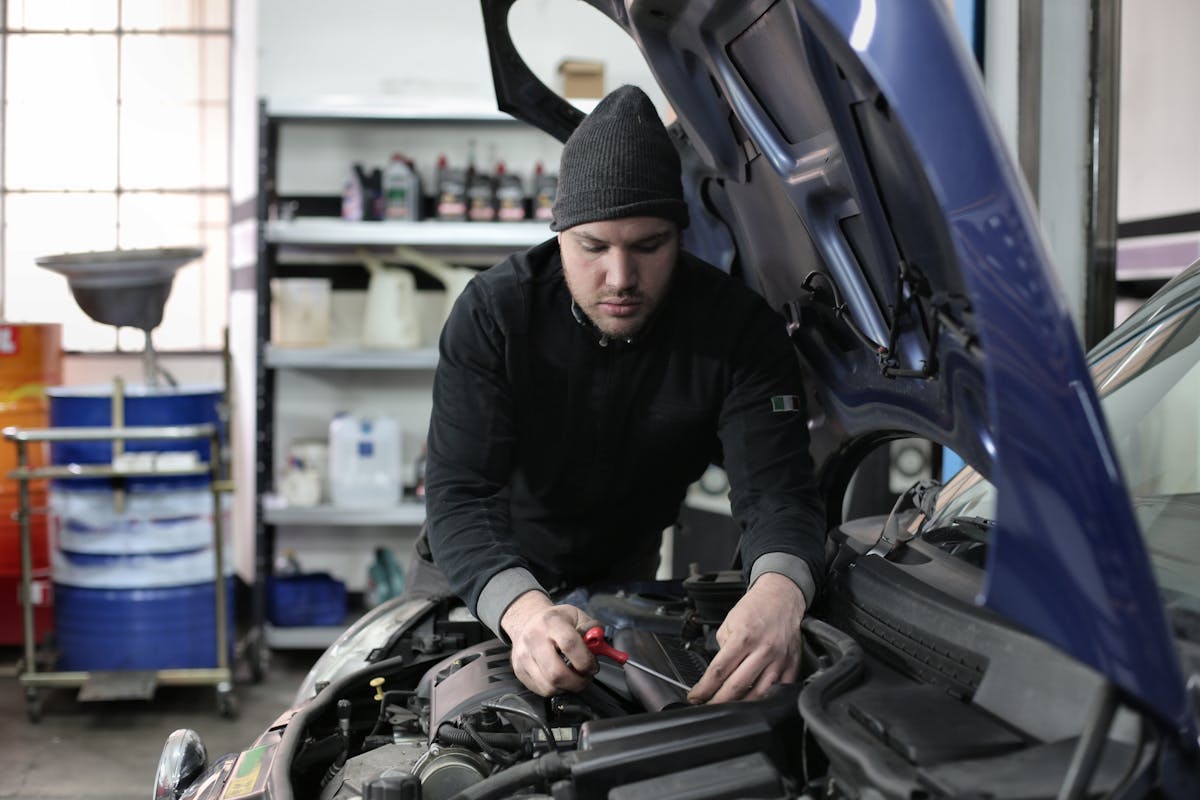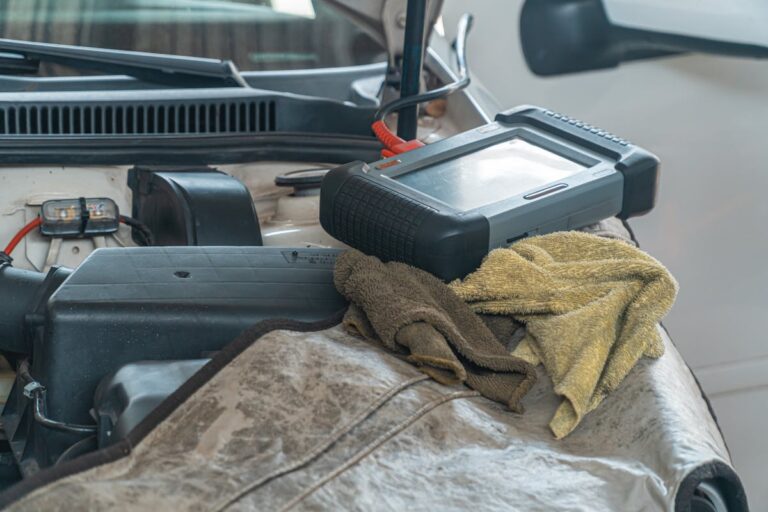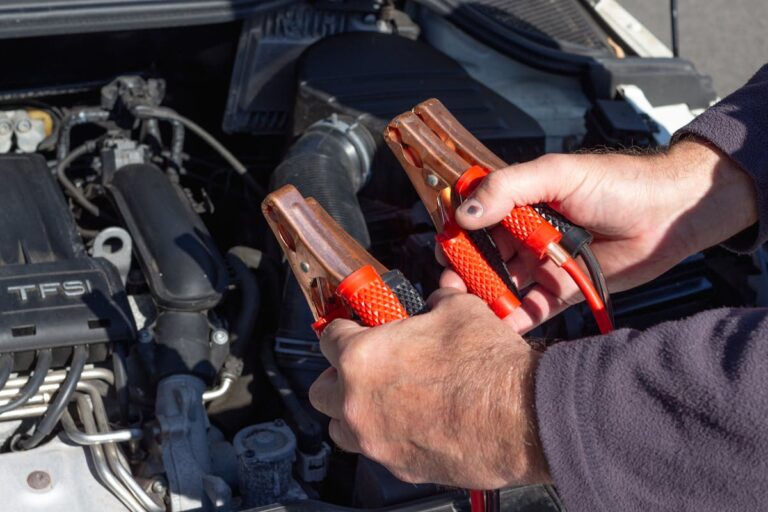When it comes to maintaining your vehicle, finding a reliable transmission shop is essential. Yet, the process can often feel intimidating, especially given the varying levels of expertise and customer service among providers. Recommendations, certifications, transparent pricing, and post-service follow-up are among the factors that can help you make an informed decision. However, the question remains: how can you guarantee these criteria are met and avoid potential pitfalls along the way? Let’s explore this topic in depth to provide you with an all-encompassing guide to secure the best service for your vehicle.
Understanding Transmission Repair Basics
In the domain of automotive repairs, understanding the basics of transmission repair is an important first step. Transmissions are complex mechanisms that control the application of power from the engine to the drive shaft. They are made up of many interconnected parts, each of which can fail, leading to the need for repair or replacement.
There are several transmission types, including manual, automatic, and continuously variable transmissions (CVT). Each type has unique components and operational features, which can influence repair costs. Manual transmissions, for example, often have simpler designs and consequently lower repair costs compared to automatic transmissions. CVTs, on the other hand, are more technologically advanced and their repairs can be more expensive due to the specialized knowledge and parts required.
Repair costs vary widely, depending on the type of transmission, the extent of damage, and the labor rates of the shop. A minor repair might cost a few hundred dollars, while a full transmission replacement could reach several thousand. It is vital to understand these basics before seeking a repair shop, as it will enable informed decisions regarding the reliability and cost-effectiveness of the offered services.
Researching Local Transmission Shops
Taking the first step towards finding a reliable transmission shop involves thorough research of local options. Begin by asking friends, family, and colleagues for local recommendations. These first-hand experiences can provide invaluable insights into the quality of work, customer service, and pricing of different businesses.
After gathering a list of potential shops, conduct your own shop comparisons. Consider factors such as proximity to your home or workplace, the range of services offered, and the shop’s reputation within the community. Visit the premises to assess the cleanliness and organization of the shop. A well-kept, orderly shop often indicates a commitment to professionalism and attention to detail.
While evaluating, take note of the shop’s certifications. These are typically displayed prominently and indicate that the shop employs technicians who have passed competency exams in different areas of auto repair.
Engage in conversation with the shop employees. Their willingness to explain their processes and answer questions can be a good indicator of their customer service approach.
Checking Online Reviews and Ratings
In the process of locating a reliable transmission shop, examining online reviews and ratings is an essential step. Understanding online ratings will provide an insight into the overall performance of the shop, while evaluating the authenticity of reviews will guard against misleading information. These two factors combined can greatly influence the decision-making process, ensuring you choose the right shop for your transmission needs.
Understanding Online Ratings
Your quest for a trustworthy transmission shop begins with an in-depth exploration into the world of online ratings and reviews. This digital territory provides valuable insights into a shop’s online reputation, an essential factor in determining its reliability.
Online ratings, often on a scale from one to five stars, offer a snapshot of a shop’s overall performance. They represent aggregate customer feedback on various aspects of service delivery, including quality of work, timeliness, communication, and professionalism. A higher average rating suggests greater customer satisfaction and, consequently, a higher likelihood of the shop being reliable.
However, while these ratings are helpful, they should not be used in isolation. You should also carefully read through the customer reviews. These provide more detailed feedback and can shed light on specific experiences. They allow you to see if a shop consistently meets or exceeds customer expectations, or if there are ongoing issues.
Evaluating Review Authenticity
How can one differentiate between genuine and fake reviews? The answer lies in the careful evaluation of review sources and the identification of authenticity indicators.
Reliable review sources are often platforms that have robust fraud detection systems. These may include well-known business directories, industry-specific review sites, and social media platforms. Observing the general tone, language use, and specificity of the reviews can provide clues to their authenticity. Genuine reviews tend to contain specific details about a person’s experience, while fake reviews may be vague or overly enthusiastic without substantial reasons.
Authenticity indicators can range from the reviewer’s profile, history of posting, to the timing and consistency of reviews. Profiles with a single review or multiple reviews posted within a short timeframe may raise red flags. Additionally, a sudden influx of positive or negative reviews could indicate manipulation attempts.
Understanding the interplay between review sources and authenticity indicators is essential in discerning the credibility of online reviews. While it may require some effort, this analysis can greatly help in finding an honest, reliable transmission shop and avoiding potential scams.

Verifying Certifications and Experience
Selecting a transmission shop with proven credentials and industry experience is essential to ensuring quality service. The certification importance cannot be overstated as it serves as a guarantee that the shop operates within the industry’s accepted standards.
Certifications from recognized bodies such as the National Institute for Automotive Service Excellence (ASE) and the Automatic Transmission Rebuilders Association (ATRA) are reliable indicators of a shop’s technical competence. These certifications are earned through rigorous examinations and require ongoing education to maintain, ensuring that certified technicians are up-to-date with the latest industry developments.
Likewise, the relevance of experience is paramount. A long-standing presence in the industry often denotes a depth of knowledge that can only be acquired over time. This experience translates into an understanding of various transmission models, effective diagnostic techniques, and the ability to deliver effective solutions.
However, be cautious of shops claiming many years of experience without the certifications to back it up. Both aspects should go hand in hand to assure a competent service. By prioritizing these two factors, you can better identify a reliable transmission shop that can meet your needs with the highest level of expertise.
Evaluating Customer Service Quality
The aspect of customer service plays an essential role in the overall experience with a transmission shop. Excellent customer support can make a significant difference, regardless of whether you’re dealing with routine maintenance or more complex repairs. It is pivotal to assess the quality of service interactions to guarantee your vehicle is in good hands.
When evaluating customer service quality, the timeliness and clarity of communication should be considered. The best transmission shops are those who readily provide clear information about the repair process, expected timelines, and potential issues. They should be honest and transparent, avoiding technical jargon that may confuse non-mechanical customers.
Another vital customer service aspect is the shop’s willingness to answer queries and explain the required work in detail. Their ability to make customers feel valued and significant underscores their commitment to superior service. It’s essential to recognize how the staff treats you, as this often reflects the quality of their work.
Lastly, consider the shop’s after-service follow-up. Good transmission shops guarantee their customers are satisfied even after the service is completed. The professionalism and quality of customer support reveal a lot about the shop’s values and can serve as a reliable indicator of their overall service quality.
Comparing Pricing and Warranty Policies
Digging deeper into your quest for a reliable transmission shop, the evaluation of pricing and warranty policies is a significant step that cannot be overlooked. It goes beyond the basic need of affordability; it’s about finding value for your money and securing a safety net for potential future issues.
Pricing transparency is a sign of an honest and reliable establishment. It includes providing clear, detailed estimates, and avoiding hidden costs. Beware of shops that offer unbelievably low prices; they may cut corners or have hidden fees. A trustworthy shop should be willing to explain their fees and provide a detailed invoice.
Warranty coverage is another important factor to take into account. A good transmission shop will stand behind their work and offer a warranty to back it up. This provides a layer of financial protection and peace of mind for the customer. The warranty should cover both parts and labor, and the duration should be reasonable.
Making the Final Decision
The final decision in selecting a reliable transmission shop hinges on a careful evaluation of shop credentials and a thorough assessment of service quality. A thorough examination of these factors will guarantee that your selection meets the highest standards of expertise and service. By making an informed decision, you can secure both the longevity of your vehicle and peace of mind in your choice of a transmission shop.
Evaluating Shop Credentials
Trustworthy credentials serve as a beacon of reliability when selecting a transmission shop for your vehicle. A shop’s reputation is an essential factor that reflects its commitment to delivering excellent service. High standing in the community, positive customer reviews, and recommendations are markers of a reputable shop. However, beyond reputation, the qualifications of the technicians play an important role in determining the shop’s credibility.
Technician qualifications are a direct indication of their proficiency and expertise. It is prudent to verify if the shop employs ASE (Automotive Service Excellence) certified technicians. This certification is a recognized standard in the automotive repair industry, indicating that the technician has passed rigorous testing and possesses a high level of skill and knowledge. Also, a shop affiliated with professional organizations like the Automatic Transmission Rebuilders Association (ATRA) or the National Institute for Automotive Service Excellence (ASE) shows a commitment to upholding industry standards.
Assessing Service Quality
A significant portion of your final decision should rest on the quality of service provided by the transmission shop. Service quality is a complex metric that includes factors like technical competency, service expectations, communication skills, and how well the shop aligns with your needs.
To gauge the service quality at a transmission shop, consider the following:
- Technical Competency: Does the shop have the required expertise to handle diverse transmission issues? This speaks to their ability to diagnose and fix problems accurately and promptly.
- Service Expectations: Did the shop meet or exceed your service expectations? This includes factors like timeliness, cleanliness, and customer service.
- Communication Skills: How effectively does the shop communicate? Good communication should be clear, concise, and respectful, keeping you informed about the progress of the repairs.
- Alignment with Needs: Does the shop understand and cater to your specific needs? This might involve flexibility in scheduling, pricing options, or offering courtesy services like shuttle rides or rental cars.
Frequently Asked Questions
What Are Common Signs of Transmission Issues in My Vehicle?
Common signs of transmission issues include changes in transmission fluid color or level, unusual noises when shifting gears, and slipping gears, which is when your vehicle changes gears unexpectedly during driving.
How Long Does a Typical Transmission Repair or Replacement Take?
Transmission repair or replacement timelines vary widely, typically ranging from 3 to 5 days. However, these timelines can fluctuate based on the complexity of the issue and the workload of the repair shop.
Does My Vehicles Age or Make Affect the Cost of Transmission Repair?
Yes, your vehicle’s age and make can affect transmission repair costs. Older or rare models may require specialized parts or expertise, increasing expenses. Generally, advanced vehicle specifications can also influence the complexity and cost of repairs.
How Do I Maintain My Transmission Post-Repair to Prevent Future Issues?
Maintaining your transmission post-repair involves regular checks and timely replacement of transmission fluid. Regular inspections can identify potential issues early, helping prevent future problems. Following manufacturer’s guidelines will also assist in prolonging your transmission’s life.
Do Transmission Shops Offer Any Sort of Financing Options for Extensive Repairs?
Yes, many transmission shops do offer financing options for extensive repairs. This can include in-house payment plans or third-party repair financing, which can help make the repair process more financially manageable for customers.





